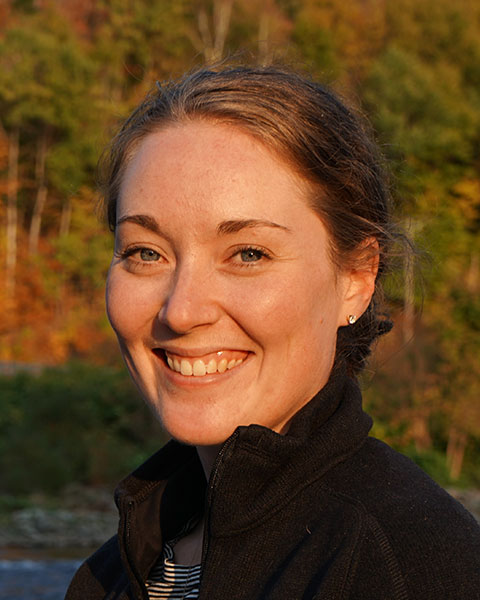Eating Disorders
Symposium 92 - Leveraging Advanced Technology and Data Analytics to Better Understand the Role of Sleep Dysregulation in Eating Disorders
Level of Familiarity: Basic to moderate
Recommended Readings: Allison, K. C., Spaeth, A., & Hopkins, C. M. (2016). Sleep and eating disorders. Current psychiatry reports, 18, 1-8., Cooper, A. R., Loeb, K. L., & McGlinchey, E. L. (2020). Sleep and eating disorders: Current research and future directions. Current Opinion in Psychology, 34, 89-94., Manasse, S. M., Lampe, E. W., Gillikin, L., Trainor, C. M., Abber, S. R., Fitzpatrick, B., ... & Juarascio, A. S. (2022). An examination of daily sleep characteristics and subsequent eating disorder behavior among individuals with binge-spectrum eating disorders. Eating and Weight Disorders-Studies on Anorexia, Bulimia and Obesity, 27(8), 3743-3749., ,
-

Elizabeth Lampe, M.S. (she/her/hers)
Ph.D. Candidate
Drexel University
Philadelphia, Pennsylvania, United States -
SK
Shruti S. Kinkel-Ram, M.A. (she/her/hers)
Clinical Psychology Doctoral Student
Miami University
Oxford, Ohio, United States -
KA
Kelly Allison, Ph.D. (she/her/hers)
Perelman School of Medicine at the University of Pennsylvania
Philadelphia, Pennsylvania, United States -

Christina Ralph-Nearman, M.S., Ph.D.
Assistant Research Professor
University of Louisville
Louisville, Kentucky, United States -
KC
Kara Christensen Pacella, Ph.D. (she/her/hers)
Assistant Professor
University of Nevada, Las Vegas
Las Vegas, Nevada, United States -

Elizabeth Lampe, M.S. (she/her/hers)
Ph.D. Candidate
Drexel University
Philadelphia, Pennsylvania, United States -
SM
Stephanie Manasse, Ph.D. (she/her/hers)
Drexel University
Philadelphia, Pennsylvania, United States -
SK
Shruti S. Kinkel-Ram, M.A. (she/her/hers)
Clinical Psychology Doctoral Student
Miami University
Oxford, Ohio, United States
Chair(s)
Discussant(s)
Presenter(s)
A growing body of research has demonstrated that sleep dysregulation (e.g., difficulties falling or staying asleep, circadian misalignment of sleep) is not only common among individuals with eating disorders (EDs; Allison et al., 2016; Kim et al., 2010) but also uniquely contributes to biopsychosocial impairment in this population (Cooper et al., 2020). For example, sleep dysregulation is associated with hypertension (Li et al., 2021), diabetes (nothaisintawee et al., 2016), and overall reduced well-being (Kyle et al., 2010). Sleep dysregulation is also a well-established risk-factor for psychopathology such as depression, anxiety, post-traumatic stress disorder, and greater severity of ED behaviors (Hertenstein et al., 2019; Li et al., 2016; Manasse et al., 2022; Thun et al., 2019). Sleep dysregulation has also been linked with poorer treatment outcomes across the diagnostic spectrum e.g., Babson et al., 2013; Chen et al., 2017; Manber et al., 2008; Ohayon and Roth, 2003; Short et al., 2017, including among individuals with EDs (Manasse et al., under review). As such, understanding the role of sleep dysregulation among individuals with EDs is critical for the development of targeted interventions which can improve both sleep dysregulation and ED pathology. However, literature in this area has been impaired by reliance on retrospective self-report of both eating and sleep over long periods (e.g., weeks to months), limiting our ability to identify specific, modifiable targets for intervention. On a shorter timescale, research in this area has yet to explore within-day associations of sleep dysregulation with next-day ED behaviors, within-person differences in associations between sleep and ED pathology, and bridge symptoms linking sleep dysregulation and ED behavior engagement. In this symposium, five researchers will present novel findings leveraging advanced technology and data analytics to address these important questions. First, Dr. Christina Ralph-Nearman will present findings from a network analysis on bridge symptoms linking sleep dysregulation and ED pathology. Second, Dr. Kara Christensen-Pacella will use ecological momentary assessment (EMA) to untangle complex relationships between sleep quality and ED behaviors. Third, Elizabeth Lampe will present findings demonstrating that pre-binge elevations in negative affect may form an explanatory link between nightly sleep dysregulation and next-day binge eating. Fourth, Dr. Stephanie Manasse will use both EMA and passive sensor measurement of sleep to identify predictors of next-day binge eating and overeating in an adolescent sample. Finally, Shruti Kinkel-Ram will present within-person associations between sleep dysregulation and suicidal ideation among ED patients at a higher level of care. Dr. Kelly Allison, an expert in the intersection between EDs and sleep dysregulation (Allison et al., 2016) will serve as the discussant for the symposium.
Learning Objectives:
- Discuss relationships between sleep and eating disorder behaviors on a day-to-day level.
- Explain within-person relationships between changes in sleep and eating disorder behaviors.
- Discuss the implementation of EMA and sensors to measure sleep and eating disorder symptoms.
- Identify the role of sleep processes in maintaining broader disordered eating pathology.
- Identify bridge symptoms linking sleep disturbance and eating disorders.
Presentations:
-
2:30 PM - 4:00 PM EST(SYM 92) Using Network Analysis to Identify Key and Pathway Symptoms Among Sleep Disturbance Symptoms in Eating Disorder Samples and Co-occurring Post-traumatic Stress Disorder
Speaker: Christina Ralph-Nearman, M.S., Ph.D. – University of Louisville
Co-author: Christina Ralph-Nearman, M.S., Ph.D. – University of Louisville
Co-author: Sofie Glatt, B.A. – University of Louisville
Co-author: Kathryn Pasquariello, MS – University of Louisville. Suffolk University
Co-author: Madison Hooper, M.S. – University of Louisville
Co-author: Taylor Penwell, B.A. (she/her/hers) – University of Montana
Co-author: Abigail McCarthy, B.S. – University of Louisville
Co-author: Brenna Williams, M.S. – University of Louisville
Co-author: Cheri Levinson, Ph.D. (she/her/hers) – University of Louisville
-
2:30 PM - 4:00 PM EST(SYM 92) Sleep Quality Is Not Associated with Daily Disordered Eating Behaviors in a Sample of Young Women with Disordered Eating
Speaker: Kara A. Christensen Pacella, Ph.D. (she/her/hers) – University of Nevada, Las Vegas
Co-author: Kara A. Christensen Pacella, Ph.D. (she/her/hers) – University of Nevada, Las Vegas
Co-author: Joseph Ayres, BA – University of Illinois - Chicago
Co-author: Yiyang Chen, Ph.D. – University of Kansas
Co-author: Kelsie Forbush, Ph.D. (she/her/hers) – University of Kansas
-
2:30 PM - 4:00 PM EST(SYM 92) Negative Affect Mediates the Association Between Nightly Sleep and Next-day Binge Eating
Speaker: Elizabeth Lampe, M.S. (she/her/hers) – Drexel University
Co-author: Elizabeth Lampe, M.S. (she/her/hers) – Drexel University
Co-author: Jannah Moussaoui, B.S. – Drexel University
Co-author: Adrienne Juarascio, Ph.D. (she/her/hers) – Drexel University
Co-author: Stephanie Manasse, Ph.D. (she/her/hers) – Drexel University
-
2:30 PM - 4:00 PM EST(SYM 92) Sleep Characteristics and Next-day Loss-of-control Eating in Adolescents: An Ecological Momentary Assessment and Sensor Study
Speaker: Stephanie Manasse, Ph.D. (she/her/hers) – Drexel University
Co-author: Stephanie Manasse, Ph.D. (she/her/hers) – Drexel University
Co-author: Elizabeth Lampe, M.S. (she/her/hers) – Drexel University
Co-author: Laura Rubino, B.A. – Drexel University
-
2:30 PM - 4:00 PM EST(SYM 92) Restless Nights, Restless Appetites: Exploring the Links Between Sleep Dysfunction and Agitation on Suicidality Among Eating Disorder Patients
Speaker: Shruti S. Kinkel-Ram, M.A. (she/her/hers) – Miami University
Co-author: William Grunewald, M.A. – Auburn University
Co-author: Lindsay Bodelll, PhD (she/her/hers) – Western University
Co-author: April Smith, Ph.D. (she/her/hers) – Auburn University

.png)
